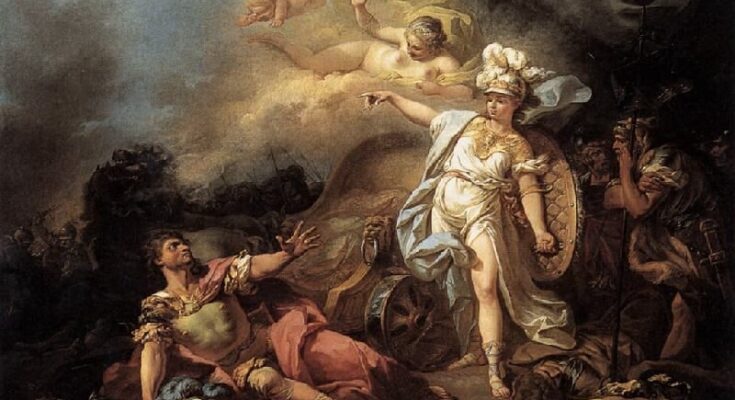The Greeks understood that war had two approaches, captured by the contrasting personas of two powerful gods: Athena and Ares. These deities represented opposing perspectives on warfare—one rooted in ruthless, unrestrained violence and the other in strategic, calculated combat. Through their myths and religious practices, the Greeks favored one approach over the other, reflecting their broader views on the nature of war.
Ares: Brutal warfare
Ares, the god of war, personified the raw and savage aspects of conflict. He embodied the chaotic and destructive forces unleashed in battle. In Homer’s Iliad, Ares appears as a force of nature, driven by bloodlust and a thirst for carnage. His role in the Trojan War highlights the brutal side of war. Ares fights not out of loyalty or for a just cause but for the sheer thrill of battle.
The Iliad portrays Ares as a frenzied warrior who revels in destruction, perfectly capturing the brutal approach to war that he embodies. He joins the battlefield with the Trojans, spreading chaos and fear. His approach is straightforward: overwhelm the enemy with sheer force. However, this brute strength often leads to his downfall.
In one episode, the Greek hero Diomedes wounds Ares with Athena’s help. Despite Ares’ immense power, he cannot withstand the combined force of human valor and divine strategy, making obvious the limits of his brutal approach.
Ares often highlights the dangers of unchecked violence. In the myth of the Aloadae, Otus and Ephialtes, twin titans, capture Ares and imprison him in a bronze jar for thirteen months. This story emphasizes the limits of Ares’ reliance on brute strength. His inability to escape or outsmart his captors shows how raw power lacking in intelligence or strategy can lead to failure.
Athena: Strategic warfare
In stark contrast, Athena represents a different side to war, symbolizing a strategic approach to battle. She embodies warfare’s disciplined and calculated aspects, whereby intelligence and precision reign supreme. Athena does not oppose war. Instead, she approaches it calmly and calculatedly. Whereas Ares charges headlong into battle, Athena uses her intellect to guide her actions.
Athena’s role in the Iliad reflects this approach. She aids the Greeks by offering strategic counsel and enhancing the abilities of key warriors. Her guidance to Diomedes in his confrontation with Ares serves as a prime example. While Ares seeks to overpower through might, Athena advises Diomedes on when and how to attack, ensuring victory with minimal unnecessary loss.
This contrast between Ares and Athena is also evident in the Gigantomachy, the battle between the Olympian gods and the Titans. Ares charges into the fray with aggression, but Athena uses her intelligence to outmaneuver her opponents. She defeats the titan Pallas, then uses his skin as her armor. It is a symbolic act that portrays her ability to turn an enemy’s strength to her advantage. Athena’s actions during the Gigantomachy highlight her role as a tactician, always several steps ahead, using strategy rather than brute force to attain victory.
The Greek preference
The ancient Greeks clearly favored Athena’s approach to war over that of Ares. This preference is reflected in both their myths and religious practices. Athena received widespread reverence, particularly in Athens, the city that bore her name. The Greeks saw her as a protector of the polis, a symbol of the wisdom and order essential for a well-functioning society.
In contrast, Ares was less honored and often depicted negatively. His few temples and limited worship suggest that the Greeks viewed his brand of warfare—brutal, chaotic, and uncalculated—with disdain. The myth of Cadmus and the dragon illustrates this further.
After Cadmus kills a dragon sacred to Ares, the god demands eight years of servitude as punishment. However, once Cadmus completes his sentence, Athena steps in to help him found Thebes. She turns the aftermath of violence into the creation of a thriving city.
This myth captures the Greek belief that war, when guided by wisdom and strategy, may lead to positive outcomes. In contrast, as illustrated by Ares, war driven by rage and revenge only brings destruction and suffering.
The two approaches to war
The Greeks’ favoritism towards Athena over Ares reflects more than just a preference for one deity. It echoed their values and understanding of the two approaches to war. One is brutal and reactionary, while the other is strategic and precise. Athena was the natural choice as the superior deity of war in a society that prized reason, order, and strategic thinking.
Her victories over Ares in various myths symbolize the triumph of intelligence and discipline over uncontrolled violence. The Greeks recognized that while war was sometimes necessary, it was far better to approach it with Athena’s mind than with Ares’ fury.
In this way, the two methods of war embodied by Athena and Ares represent the dual nature of conflict. The Greeks chose to honor Athena’s approach, understanding that the true power of war lies not in the chaos of battle but in the discipline and strategy that can turn conflict into lasting peace.



